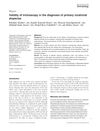Evaluation of Hair and Scalp Diseases in Turkish Women
March 2019
in “
Dicle Medical Journal / Dicle Tip Dergisi
”

TLDR Hair and scalp diseases affect 11% of Turkish women, with seborrheic dermatitis being the most common.
This study aimed to evaluate hair and scalp diseases in Turkish women by retrospectively reviewing the records of 18,743 women over 18 years old who visited a dermatology clinic between February 2015 and February 2018. Out of these, 1,857 women (11.09%) were found to have hair and scalp diseases, with an average age of 35.82 years. The most common conditions identified were seborrheic dermatitis (43.5%), telogen effluvium (25.4%), psoriasis (16.4%), alopecia areata (6.7%), and androgenic alopecia (4.8%). The study highlighted the importance of early diagnosis and treatment of these conditions due to their impact on self-confidence and quality of life. The rate of scarring alopecia was low at 2.27%.











